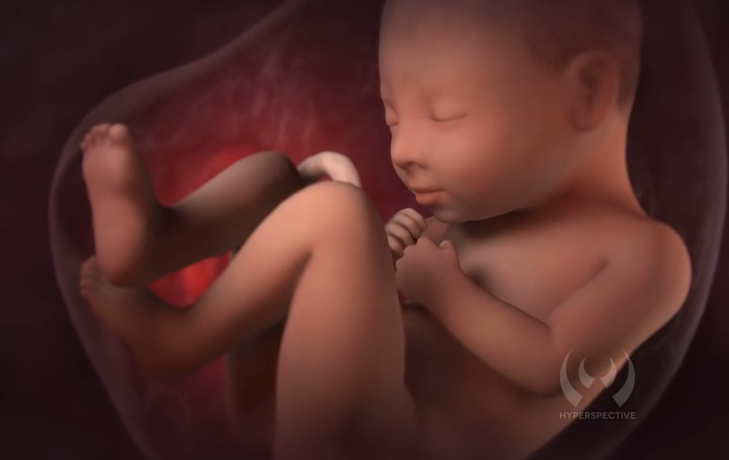I became “pro-life” long before I realized that abortion had been legalized nationwide in 1973. And I didn’t even know it.
Though it more than five decades ago, I still can recall that moment in 1964. My mom, over 40 and already the mother of myself and my five younger siblings, encouraged me to touch her by-then prominent belly and then place my ear on it.
Talk about black and white becoming Technicolor. The abstraction that my youngest brother had been previously had now become a concrete, living, moving human being.
Wow.
That vivid memory was the first thing that crossed my mind when I read, “A Baby’s Kick Changes Everything about Abortion,” by Georgi Boorman.
After I read the post, it occurred to me how infrequently we talk about an unborn baby’s first kick these days, what we used to call “quickening.” Because ultrasound pictures are almost ubiquitous (and take place earlier in pregnancy), comparatively little attention is paid to that moment which occurs somewhere around the 20th week.
Boorman’s baby packs a wallop. As she writes,
No, it’s not comfortable. No, it doesn’t feel “natural,” not because it isn’t, but because there’s nothing I’ve felt quite like it. My husband told me our baby never felt more real than after she started kicking. The ultrasounds were beautiful, especially seeing her heartbeat. But it was still more conceptual at that point. When you feel her move, it’s like she’s saying, “I’m here! I’m real! I’ll be out in the world soon!”
Then, a few paragraphs later
For the first time in my life, the life of my baby is more than a concept, and so now all my reactions to pro-abortion articles are physical, not just intellectual or even emotional.
These reassuring comments are bracketed by her thoughts on abortion and help the reader understand her responses. First, quoting Lindy West, the pro-abortion author of a new book excerpted in Glamour magazine, she wonders how anyone can write the following:
I don’t give a damn why anyone has an abortion. I believe unconditionally in the right of people with uteruses to decide what grows inside their body and feeds on their blood and reroutes their future. There are no ‘good’ abortions and ‘bad’ abortions, there are only pregnant people who want them and pregnant people who don’t, pregnant people who have access and support and pregnant people who face institutional roadblocks…”
But they do. In more polite, more discrete language, that is precisely the view people like Hillary Clinton subscribes to.
On the back side of this quote, Boorman is particularly distraught by women who have already given birth to children but who, nonetheless, abort. I was encouraged that “a gentler thought [came] to cover my anger.”
That all women who’ve aborted not only “need healing” but also “need divine forgiveness and grace, as we all do.” She continues
The empathy I have with these mothers is that of a fellow sinner in need of redemption. … But grace has already come through Christ, and he mends what is torn. It is through him that we can love fully; he replaces the turmoil of our wrongdoing with a peace “that transcends all understanding.”
One other thought about Mrs. Boorman post at the Federalist.
My baby is real—not just real to me, but objectively real. She shows up in my blood test and on the ultrasound, and others can feel her kicks. She is very much a human being.
However, as the quote from Ms. West reveals, to the pro-abortion mind the child is not “objectively real.” Or, better put, it doesn’t make any difference. The only question is “wantedness.”
Thank goodness it would never have occurred to my mother that the lives of the seven Andruskos depended on us being “wanted.”
LifeNews.com Note: Dave Andrusko is the editor of National Right to Life News and an author and editor of several books on abortion topics. This post originally appeared in at National Right to Life News Today —- an online column on pro-life issues.








